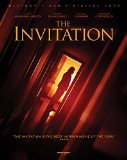| Reviews & Columns |
|
Reviews DVD TV on DVD Blu-ray 4K UHD International DVDs In Theaters Reviews by Studio Video Games Features Collector Series DVDs Easter Egg Database Interviews DVD Talk Radio Feature Articles Columns Anime Talk DVD Savant Horror DVDs The M.O.D. Squad Art House HD Talk Silent DVD
|
DVD Talk Forum |
|
|
| Resources |
|
DVD Price Search Customer Service #'s RCE Info Links |
|
Columns
|
|
|
Invitation, The
Drafthouse Films // Unrated // July 26, 2016
List Price: $34.95 [Buy now and save at Amazon]
The Film:
Emotions created by resentment, vengeance, and heartache have motivated all sorts of monsters in cinema, yet these persuasive and reality-distorting states of mind often don't take center stage as the actual villains responsible for the horrors occurring on-screen. That's what happens in The Invitation, the micro-budget, one-location surprise from Karyn Kusama, where the struggle people have with longstanding, irrepressible grief becomes its own form of manipulative antagonist in a disturbing situation. This thriller, which combines a cult's persuasive recruitment tactics and the suspicions of a wary partygoer reentering his social circle, cooks up constant uncertainty and anxiety driven by the impact that personal trauma inflicts on different people's psyches over time. Despite a few flags raised over how the dinner guests respond to the oddities of their situation, The Invitation taps into something relatable and authentic that makes its uncompromising swell of tension incredibly absorbing to behold.
Winding upwards through the Hollywood hills, a couple makes their way to a dinner party. It's a reunion of sorts for a tightly-knit group of friends, who haven't all been together since the split of Will (Logan Marshall-Green) and Eden (Tammy Blanchard) following a personal tragedy. Will, who has been in a dark and mostly cut-off frame of mind over those years, enters the party with a cloud hanging over his entire being --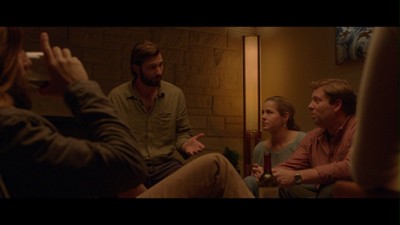 though he arrives with a new girlfriend, Kira (Emayatze Corinealdi). Eden, the member of wealthy family who sent out The Invitations, has also developed a new relationship, with David (Michael Huisman). Unlike Will, she seems incredibly content and liberated following their catastrophe, which stems from her involvement with a collective of people centered on bizarre methods of alternative therapy and internal healing. A cult, in so many words, which quickly raises suspicions as the night grows longer, the wine flows, and the cult member's persuasive tactics grow stronger and stranger.
though he arrives with a new girlfriend, Kira (Emayatze Corinealdi). Eden, the member of wealthy family who sent out The Invitations, has also developed a new relationship, with David (Michael Huisman). Unlike Will, she seems incredibly content and liberated following their catastrophe, which stems from her involvement with a collective of people centered on bizarre methods of alternative therapy and internal healing. A cult, in so many words, which quickly raises suspicions as the night grows longer, the wine flows, and the cult member's persuasive tactics grow stronger and stranger.
Naturally, the one most suspicious of Eden's transformation is her ex-husband, Will, who experienced the same caliber of grief as her, yet hasn't enjoyed the kind of closure that she has over the events. After an unsettling beginning involving a road-kill coyote that establishes Will's chilly pragmatism and resolve, The Invitation steadily draws attention to his observant, distant demeanor as everyone else at the party tries to reacquaint, fleshing out his personality and prior whereabouts through offhand observations. What's really clever about this lies in how reliable -- or unreliable -- he might be as such as observer, considering his state of mind and his uneasiness in a home within which he once lived. He's our eyes and ears, and his suspicion of the hosts' attitudes and life choices translates to our own suspicion ... but should it? Logan Marshall-Green's painful eyes and somber yet electrified body language speaks volumes about the raw wounds and misgivings stirring in Will's headspace, one that invites the audience's empathy and curiosity toward what precisely made him into such a wistful person.
Cultism gets brought up in a fairly casual fashion during the dinner party, and the initial response toward its introduction -- to the idea of close friends becoming involved with a particularly disturbing one and then starting their "recruitment" -- becomes The Invitation's solitary, unavoidable stumbling block. Sure, had the dinner guests all packed up and left after Eden's new dogma was bared for all to see, one that's assuredly unusual and morbid enough to spark such a reaction, then the premise wouldn't exist. Even taking that unlikelihood into account, however, the film offers relevant questions to ponder, mostly about emotional courtesy and how long someone might be able to endure the bizarreness of a tormented friend's new approach to life after hardship. The responses from the dinner guests does form into a unique gradient of tolerant character types, from wild childs and goofballs to the cautious and unsettled, driven by genuinely empathetic performances that distract from how the cult's beliefs seem so out-there. This is, after all, a horror movie, and something's got to keep 'em around.
There's nothing cheap or easy about the suspense generated by The Invitation, though. This looming danger and insecurity continues to expand with each uptick in Will's paranoia over the cultists' motives and each progressive glimpse into how dangerous they really could be, never yielding with its ominous tone built around a degree of ambiguity over what's to be believed. Director Karyn Kusama focuses on the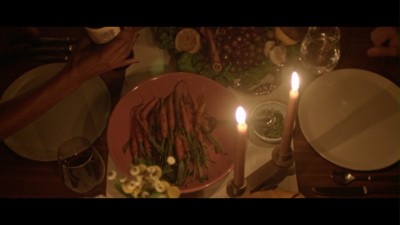 complexity of post-trauma stress and coming to grips with the death of loved ones as profound, humanizing considerations alongside that distrust, elevated by the mansion's dim and homey ambience, at once an expansive layout and claustrophobic in its many corners. Both the lavish Hollywood home itself and the relatable emotions stirring within serve up a meticulous, shockingly levelheaded setup for the events to come, and even if the emotional subject matter doesn't strike a deeper chord, it's hard not to feel the vivid escalation of dread at the center of it all.
complexity of post-trauma stress and coming to grips with the death of loved ones as profound, humanizing considerations alongside that distrust, elevated by the mansion's dim and homey ambience, at once an expansive layout and claustrophobic in its many corners. Both the lavish Hollywood home itself and the relatable emotions stirring within serve up a meticulous, shockingly levelheaded setup for the events to come, and even if the emotional subject matter doesn't strike a deeper chord, it's hard not to feel the vivid escalation of dread at the center of it all.
Revealing anything further about The Invitation would do a disservice to its bleak machinations, but there's nothing ruined in stating that director Karyn Kusama skillfully guides that tone into the trappings of traditional horror, so far removed from her previous stab at the genre, Jennifer's Body, that it's almost not worth bringing up. Not a scrap of humor can be found in the efficient, startling thrills that flows through the house in the warped final act, continuing the pragmatic attitude adopted by the build-up that proceeds it, commanded by a deft grasp on the geography of the house and the unsettled traits of the dinner guests. What happens at the end doesn't make for a profoundly scary film due to its surface-level grotesquery or thrills, though director Kusama punctuates moments in the climax with tastes of those provocations. Instead, the relatable and somber influence that grief inflicts upon those who have endured it earns Kusama's film its own kind of horror, revealing how sinister such a thing can be when twisted within the wrong mind.
The Blu-ray:
Drafthouse Films brings The Invitation to the table on Blu-ray in a very elegant package, indeed, working with a clear two-disc case -- Disc Two being the DVD presentation -- similar to that of The Criterion Collection. A cardboard slipcase duplicates the outer artwork, but only if the disc's owner wants it to, since the package arrives with a classy reversible cover design. Inside, a Booklet can be found containing a Director's Statement from Karyn Kusama and a meditative essay, "Horror of Manners, Etiquette of Grief" by critic Britt Hayes. Rounding out the package is a very cute RSVP card containing the digital download information. In the world of streamlined Blu-ray packages, this one has a lot to offer.
Video and Audio:
For the most part, The Invitation works around a lot of moody browns, yellows, and tans captured throughout the romantically-lit Hollywood mansion, with quick but vivid peeks at swimming-pool blue and pinkish-red lighting throughout. It's not an easy color or contrast scheme, but Drafthouse Films have cooked up a moderately effective high-definition transfer for the 2.35:1-framed film. Faint details in close-ups, in the textures of clothing and the creases of facial expressions from bearded men, are admirably sharp, though the general dimness of the cinematography's objectives likes to try and conceal these details. As a result, the contrast balance and general black levels present a challenge, and the visualization isn't without stumbles, sporting some noise and black crush at certain points. They fit with the mood, though, and they're paired with other exquisite representations of warm skin tones, reputable depth, and moody light balance.
Does The Invitation really need a high-definition audio track to create its mood? The heightened clarity and balance would've certainly come in handy while delivering the atmospheric music, the fluctuating volume levels of voices, and the stillness hanging in the air while other things happen in different areas of the house. Now, for a Dolby Digital 5.1 track, the audio treatment sounds quite good: loud thumps possess enough heft, dialogue remains clean and discernible without any distortion, and subtle effects trail to the rear channels alongside the soundtrack for a workable surround environment. Yet, it's tough to ignore moments that would've been more effective with just a bit more HD clarity, both in small atmospheric sound effects and the few robust bursts that come later in the film, each of which are moderately restrained. The Dolby Digital track gets The Invitation to the table, but a little more flavor would've been welcome.
Special Features:
Audio Commentary With Director Karyn Kusama and Writers Phil Hay and Matt Manfredi:
The director and the writers gather together for a particularly incisive commentary track, which hits the sweet spot between a casual tone and a very focused perspective on the content. Naturally, they discuss details about the house, filming in Hollywood, and the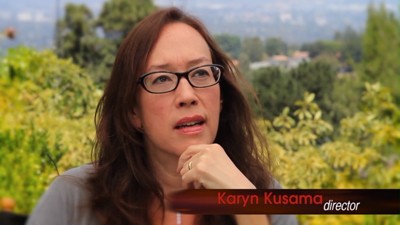 actors themselves, but the content also delves into the underlying layers of the characters and the thematic intentions of the scenes. The focus falls on Will's temperament and isolation, director Kusama's growth in learning about the importance of blocking, and how the writers interwove a sort of "ghost story" into the fabric of the film's tragedy. Very little attention gets paid to repeating the plot, instead exchanging between anecdotes about their triumphs and struggles of their shooting schedule and digging deeper into the character's depths, as well as bits about the "politeness" of the camerawork later on. Great track.
actors themselves, but the content also delves into the underlying layers of the characters and the thematic intentions of the scenes. The focus falls on Will's temperament and isolation, director Kusama's growth in learning about the importance of blocking, and how the writers interwove a sort of "ghost story" into the fabric of the film's tragedy. Very little attention gets paid to repeating the plot, instead exchanging between anecdotes about their triumphs and struggles of their shooting schedule and digging deeper into the character's depths, as well as bits about the "politeness" of the camerawork later on. Great track.
Drafthouse Films have also included a brief but potent Making of The Invitation (10:00, 16x9 HD) featurette, which includes a slew of behind-the-scenes glimpses at the film's construction and interviews with director Karyn Kusama, the writers and the cast/crew. They chat about its conception, objectives, and the experience in making the film, and they do so in a concise fashion that doesn't waste a second of the ten-minute runtime. They've also included a relatively bizarre Music Video for O My Child (1:36, 16x9), as well as a Teaser Trailer (1:07, 16x9) and a Theatrical Trailer (2:08, 16x9)
Final Thoughts:
Smart, elegant, and disturbing in all the right ways, The Invitation stands out as a phenomenal display of how stripped-down, one-location indie horror can still reach new plateaus in both unsettling tension and evocative scope. It generates enough raw suspense in its eerie dinner-party setup and universally genuine performances to appreciate on its own, but the underlying strength of its grasp on grieving as a dark force of nature takes it to another level. Drafthouse Films' Blu-ray looks and sounds good enough, though the inherent nature of the cinematography and the lack of high-definition audio don't amount to a breathtaking Blu-ray. The packaging, the commentary track, and the film itself earn it a meaty Recommendation, though.
Thomas Spurlin, Staff Reviewer -- DVDTalk Reviews | Personal Blog/Site
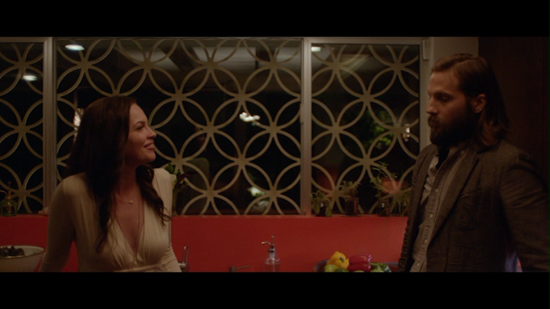 |
Emotions created by resentment, vengeance, and heartache have motivated all sorts of monsters in cinema, yet these persuasive and reality-distorting states of mind often don't take center stage as the actual villains responsible for the horrors occurring on-screen. That's what happens in The Invitation, the micro-budget, one-location surprise from Karyn Kusama, where the struggle people have with longstanding, irrepressible grief becomes its own form of manipulative antagonist in a disturbing situation. This thriller, which combines a cult's persuasive recruitment tactics and the suspicions of a wary partygoer reentering his social circle, cooks up constant uncertainty and anxiety driven by the impact that personal trauma inflicts on different people's psyches over time. Despite a few flags raised over how the dinner guests respond to the oddities of their situation, The Invitation taps into something relatable and authentic that makes its uncompromising swell of tension incredibly absorbing to behold.
Winding upwards through the Hollywood hills, a couple makes their way to a dinner party. It's a reunion of sorts for a tightly-knit group of friends, who haven't all been together since the split of Will (Logan Marshall-Green) and Eden (Tammy Blanchard) following a personal tragedy. Will, who has been in a dark and mostly cut-off frame of mind over those years, enters the party with a cloud hanging over his entire being --
 though he arrives with a new girlfriend, Kira (Emayatze Corinealdi). Eden, the member of wealthy family who sent out The Invitations, has also developed a new relationship, with David (Michael Huisman). Unlike Will, she seems incredibly content and liberated following their catastrophe, which stems from her involvement with a collective of people centered on bizarre methods of alternative therapy and internal healing. A cult, in so many words, which quickly raises suspicions as the night grows longer, the wine flows, and the cult member's persuasive tactics grow stronger and stranger.
though he arrives with a new girlfriend, Kira (Emayatze Corinealdi). Eden, the member of wealthy family who sent out The Invitations, has also developed a new relationship, with David (Michael Huisman). Unlike Will, she seems incredibly content and liberated following their catastrophe, which stems from her involvement with a collective of people centered on bizarre methods of alternative therapy and internal healing. A cult, in so many words, which quickly raises suspicions as the night grows longer, the wine flows, and the cult member's persuasive tactics grow stronger and stranger. Naturally, the one most suspicious of Eden's transformation is her ex-husband, Will, who experienced the same caliber of grief as her, yet hasn't enjoyed the kind of closure that she has over the events. After an unsettling beginning involving a road-kill coyote that establishes Will's chilly pragmatism and resolve, The Invitation steadily draws attention to his observant, distant demeanor as everyone else at the party tries to reacquaint, fleshing out his personality and prior whereabouts through offhand observations. What's really clever about this lies in how reliable -- or unreliable -- he might be as such as observer, considering his state of mind and his uneasiness in a home within which he once lived. He's our eyes and ears, and his suspicion of the hosts' attitudes and life choices translates to our own suspicion ... but should it? Logan Marshall-Green's painful eyes and somber yet electrified body language speaks volumes about the raw wounds and misgivings stirring in Will's headspace, one that invites the audience's empathy and curiosity toward what precisely made him into such a wistful person.
Cultism gets brought up in a fairly casual fashion during the dinner party, and the initial response toward its introduction -- to the idea of close friends becoming involved with a particularly disturbing one and then starting their "recruitment" -- becomes The Invitation's solitary, unavoidable stumbling block. Sure, had the dinner guests all packed up and left after Eden's new dogma was bared for all to see, one that's assuredly unusual and morbid enough to spark such a reaction, then the premise wouldn't exist. Even taking that unlikelihood into account, however, the film offers relevant questions to ponder, mostly about emotional courtesy and how long someone might be able to endure the bizarreness of a tormented friend's new approach to life after hardship. The responses from the dinner guests does form into a unique gradient of tolerant character types, from wild childs and goofballs to the cautious and unsettled, driven by genuinely empathetic performances that distract from how the cult's beliefs seem so out-there. This is, after all, a horror movie, and something's got to keep 'em around.
There's nothing cheap or easy about the suspense generated by The Invitation, though. This looming danger and insecurity continues to expand with each uptick in Will's paranoia over the cultists' motives and each progressive glimpse into how dangerous they really could be, never yielding with its ominous tone built around a degree of ambiguity over what's to be believed. Director Karyn Kusama focuses on the
 complexity of post-trauma stress and coming to grips with the death of loved ones as profound, humanizing considerations alongside that distrust, elevated by the mansion's dim and homey ambience, at once an expansive layout and claustrophobic in its many corners. Both the lavish Hollywood home itself and the relatable emotions stirring within serve up a meticulous, shockingly levelheaded setup for the events to come, and even if the emotional subject matter doesn't strike a deeper chord, it's hard not to feel the vivid escalation of dread at the center of it all.
complexity of post-trauma stress and coming to grips with the death of loved ones as profound, humanizing considerations alongside that distrust, elevated by the mansion's dim and homey ambience, at once an expansive layout and claustrophobic in its many corners. Both the lavish Hollywood home itself and the relatable emotions stirring within serve up a meticulous, shockingly levelheaded setup for the events to come, and even if the emotional subject matter doesn't strike a deeper chord, it's hard not to feel the vivid escalation of dread at the center of it all. Revealing anything further about The Invitation would do a disservice to its bleak machinations, but there's nothing ruined in stating that director Karyn Kusama skillfully guides that tone into the trappings of traditional horror, so far removed from her previous stab at the genre, Jennifer's Body, that it's almost not worth bringing up. Not a scrap of humor can be found in the efficient, startling thrills that flows through the house in the warped final act, continuing the pragmatic attitude adopted by the build-up that proceeds it, commanded by a deft grasp on the geography of the house and the unsettled traits of the dinner guests. What happens at the end doesn't make for a profoundly scary film due to its surface-level grotesquery or thrills, though director Kusama punctuates moments in the climax with tastes of those provocations. Instead, the relatable and somber influence that grief inflicts upon those who have endured it earns Kusama's film its own kind of horror, revealing how sinister such a thing can be when twisted within the wrong mind.
The Blu-ray:
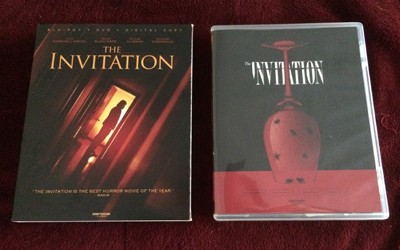 | 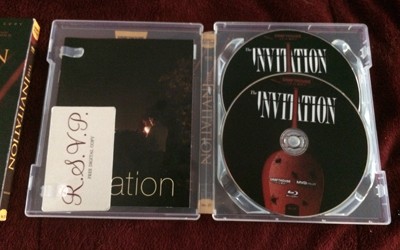 |
Drafthouse Films brings The Invitation to the table on Blu-ray in a very elegant package, indeed, working with a clear two-disc case -- Disc Two being the DVD presentation -- similar to that of The Criterion Collection. A cardboard slipcase duplicates the outer artwork, but only if the disc's owner wants it to, since the package arrives with a classy reversible cover design. Inside, a Booklet can be found containing a Director's Statement from Karyn Kusama and a meditative essay, "Horror of Manners, Etiquette of Grief" by critic Britt Hayes. Rounding out the package is a very cute RSVP card containing the digital download information. In the world of streamlined Blu-ray packages, this one has a lot to offer.
Video and Audio:
For the most part, The Invitation works around a lot of moody browns, yellows, and tans captured throughout the romantically-lit Hollywood mansion, with quick but vivid peeks at swimming-pool blue and pinkish-red lighting throughout. It's not an easy color or contrast scheme, but Drafthouse Films have cooked up a moderately effective high-definition transfer for the 2.35:1-framed film. Faint details in close-ups, in the textures of clothing and the creases of facial expressions from bearded men, are admirably sharp, though the general dimness of the cinematography's objectives likes to try and conceal these details. As a result, the contrast balance and general black levels present a challenge, and the visualization isn't without stumbles, sporting some noise and black crush at certain points. They fit with the mood, though, and they're paired with other exquisite representations of warm skin tones, reputable depth, and moody light balance.
Does The Invitation really need a high-definition audio track to create its mood? The heightened clarity and balance would've certainly come in handy while delivering the atmospheric music, the fluctuating volume levels of voices, and the stillness hanging in the air while other things happen in different areas of the house. Now, for a Dolby Digital 5.1 track, the audio treatment sounds quite good: loud thumps possess enough heft, dialogue remains clean and discernible without any distortion, and subtle effects trail to the rear channels alongside the soundtrack for a workable surround environment. Yet, it's tough to ignore moments that would've been more effective with just a bit more HD clarity, both in small atmospheric sound effects and the few robust bursts that come later in the film, each of which are moderately restrained. The Dolby Digital track gets The Invitation to the table, but a little more flavor would've been welcome.
Special Features:
Audio Commentary With Director Karyn Kusama and Writers Phil Hay and Matt Manfredi:
The director and the writers gather together for a particularly incisive commentary track, which hits the sweet spot between a casual tone and a very focused perspective on the content. Naturally, they discuss details about the house, filming in Hollywood, and the
 actors themselves, but the content also delves into the underlying layers of the characters and the thematic intentions of the scenes. The focus falls on Will's temperament and isolation, director Kusama's growth in learning about the importance of blocking, and how the writers interwove a sort of "ghost story" into the fabric of the film's tragedy. Very little attention gets paid to repeating the plot, instead exchanging between anecdotes about their triumphs and struggles of their shooting schedule and digging deeper into the character's depths, as well as bits about the "politeness" of the camerawork later on. Great track.
actors themselves, but the content also delves into the underlying layers of the characters and the thematic intentions of the scenes. The focus falls on Will's temperament and isolation, director Kusama's growth in learning about the importance of blocking, and how the writers interwove a sort of "ghost story" into the fabric of the film's tragedy. Very little attention gets paid to repeating the plot, instead exchanging between anecdotes about their triumphs and struggles of their shooting schedule and digging deeper into the character's depths, as well as bits about the "politeness" of the camerawork later on. Great track. Drafthouse Films have also included a brief but potent Making of The Invitation (10:00, 16x9 HD) featurette, which includes a slew of behind-the-scenes glimpses at the film's construction and interviews with director Karyn Kusama, the writers and the cast/crew. They chat about its conception, objectives, and the experience in making the film, and they do so in a concise fashion that doesn't waste a second of the ten-minute runtime. They've also included a relatively bizarre Music Video for O My Child (1:36, 16x9), as well as a Teaser Trailer (1:07, 16x9) and a Theatrical Trailer (2:08, 16x9)
Final Thoughts:
Smart, elegant, and disturbing in all the right ways, The Invitation stands out as a phenomenal display of how stripped-down, one-location indie horror can still reach new plateaus in both unsettling tension and evocative scope. It generates enough raw suspense in its eerie dinner-party setup and universally genuine performances to appreciate on its own, but the underlying strength of its grasp on grieving as a dark force of nature takes it to another level. Drafthouse Films' Blu-ray looks and sounds good enough, though the inherent nature of the cinematography and the lack of high-definition audio don't amount to a breathtaking Blu-ray. The packaging, the commentary track, and the film itself earn it a meaty Recommendation, though.
|
| Popular Reviews |
| Sponsored Links |
|
|
| Sponsored Links |
|
|
| Release List | Reviews | Shop | Newsletter | Forum | DVD Giveaways | Blu-Ray | Advertise |
|
Copyright 2024 DVDTalk.com All Rights Reserved. Legal Info, Privacy Policy, Terms of Use,
Manage Preferences,
Your Privacy Choices | |||||||









